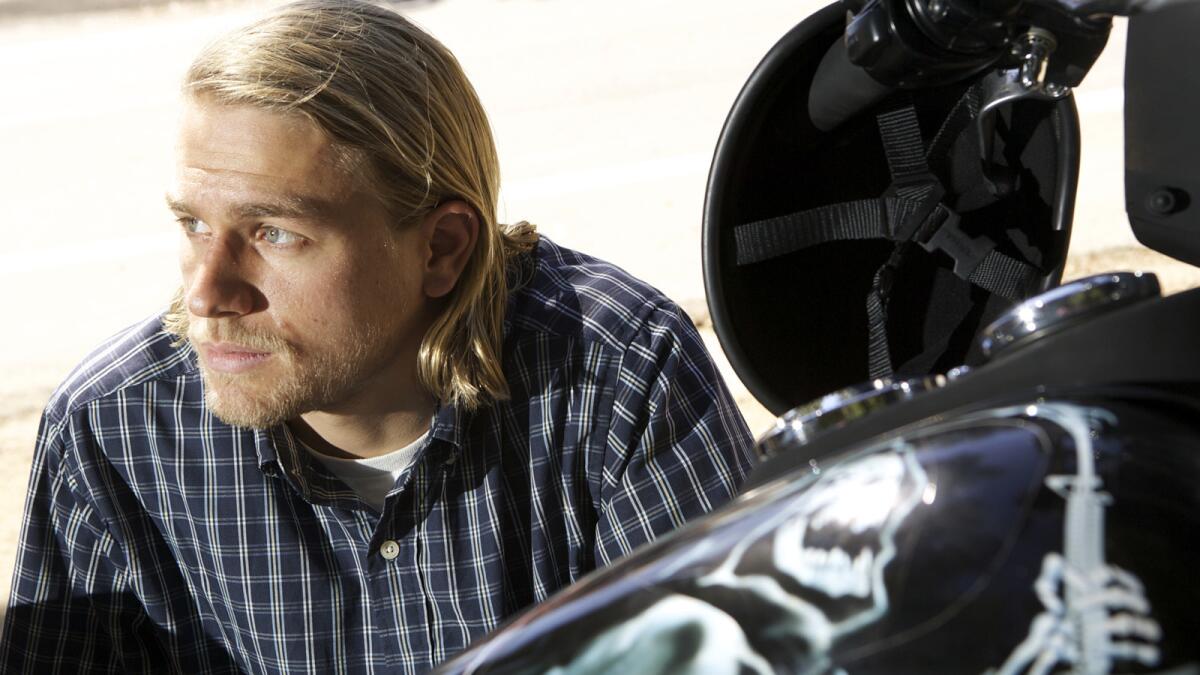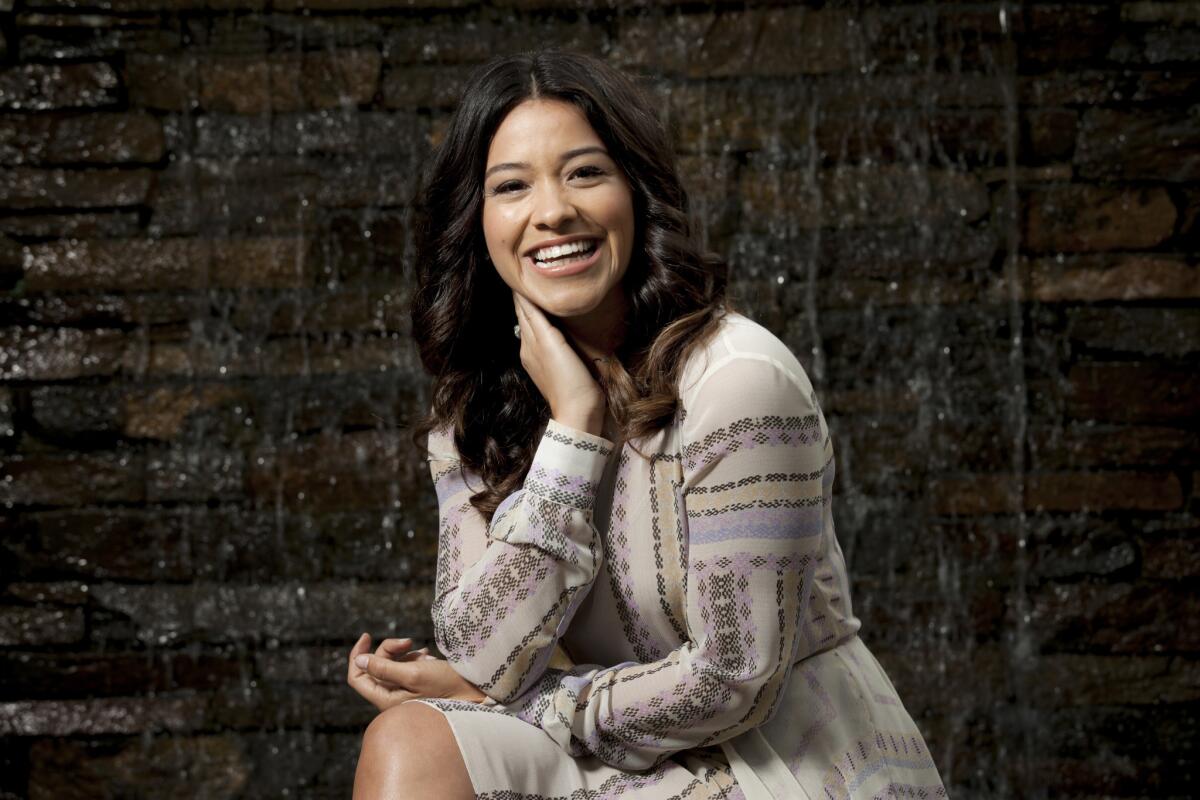In this town, it’s as if Hollywood tries not to cast Latinos
In Hollywood, there is no Magical Latino.
That honey-tongued Mexican American dude who can help the white guy with his golf game while, more important, imparting life lessons before disappearing over the horizon? He doesn’t exist. That Salvadoran woman wisely guiding the “Chosen One” — another white guy — through an alternate-reality maze to his appointed destiny? You won’t find her.
A Latino playing God as he gives up control of planet Earth to help a funny white TV reporter having a bad day at the office? Get out of here.
OSCARS 2016: Full coverage | List of nominees | #OscarsSoWhite controversy
Since the Academy Award nominations were announced, much of the #OscarsSoWhite conversation has focused on black actors. But consider Latinos, the nation’s largest minority group, even if Hollywood very often doesn’t.
Social media erupted recently with “whitewashing” accusations after the film “American Drug Lord” gave the starring role of Mexican American cartel kingpin Edgar “La Barbie” Valdez to the British actor Charlie Hunnam.

British actor Charlie Hunnam was cast as Mexican American cartel kingpin Edgar “La Barbie” Valdez in the film “American Drug Lord.”
But that dust-up distracts from a problem that reaches deeper into the casting process. Latinos have a particularly hard time getting even the kinds of cliched supporting roles that have become commonplace for black actors — the wise or wisecracking, sometimes magical guides for white protagonists.
“The industry thinks we’re foreign,” said musician and veteran actor Rubén Blades, who after many years in the entertainment business has a coveted regular role in the AMC series “Fear the Walking Dead.” “We are culturally excluded.”
And yet, according to several studies, no group buys more movie tickets when compared with their proportion of the U.S. population than Latinos. In the Motion Picture Assn. of America’s 2014 Theatrical Market Statistics report for U.S. and Canadian moviegoers, Latinos were 17% of the population but “oversampled” at 25% of North American frequent moviegoers.
As this year’s Oscars host, Chris Rock wrote in a 2014 essay for the Hollywood Reporter, “Forget whether Hollywood is black enough. A better question is: Is Hollywood Mexican enough? You’re in L.A., you’ve got to try not to hire Mexicans.”
Forget whether Hollywood is black enough. A better question is: Is Hollywood Mexican enough? You’re in L.A., you’ve got to try not to hire Mexicans.
— Comedian Chris Rock, 2014
A study by USC’s Annenberg School for Communication and Journalism found that among the 100 top-grossing movies in 2014, 73% of all speaking or named characters were white, just more than 12% were black and 5% were Asians. Latinos, who make up more than 16% of the U.S. population, were just below Asians.
How many times has Hollywood cast a white actor as a Latino protagonist? Long before Hunnam, there was Marlon Brando in “Viva Zapata!” and that famous Mexican thespian Charlton Heston in “Touch of Evil.” But we’re not even talking about getting starring roles here. If you can’t get the supporting roles, it stands to reason you won’t graduate to bigger roles.
There is one area in which Latino actors encounter few obstacles — getting cast as a housekeeper, waiter or gang member with a “heart of gold.”
“It’s like we’re always just arriving,” a Mexican American colleague once told me. We’re rarely the man or woman who just happens to be of Mexican or Latin American descent, who may or may not speak Spanish or have an accent, whose parents may or may not have crossed the border, whose history in America may or may not go back more than a century. So it shouldn’t be a surprise if in America there’s an exaggerated perception that Latinos don’t assimilate.

There are reasons to believe that change is possible. Gina Rodriguez (“Jane the Virgin”), pictured, offers a glimpse of what’s possible when Latinos get a chance.
“It’s not something that just happened,” Blades said. “They don’t usually hire a white or black actor to play the stereotype. They use Latino actors to play the stereotype. This reinforces in the minds of the bigoted their bigotry.”
There have been exceptions, of course. And there are reasons to believe that change is possible. Mexican American actor Michael Peña (“Ant-Man,” “The Martian”), Guatemala-born Oscar Isaac (“Star Wars: The Force Awakens,” “Inside Llewyn Davis” and the upcoming “X-Men: Apocalypse”), Gina Rodriguez (“Jane the Virgin”) and America Ferrera (“Superstore”) offer a glimpse of what’s possible when Latinos get a chance.
Avy Kaufman, a top casting director who has worked with directors including Ang Lee, Steven Spielberg and Lars von Trier, points to actors such as Edgar Ramirez (“The Bourne Ultimatum”) as reasons to be hopeful that Hollywood is opening up. The Venezuelan actor is set to play opposite Matthew McConaughey in an upcoming movie and will star as Panamanian boxing legend Roberto Duran with Robert De Niro and Blades. And she cast Isaac early in his career, before he became a star; in May, he’ll star as the title villain in “X-Men: Apocalypse.”
Kaufman said she has worked on movies and TV shows in which actors and actresses of specific backgrounds are sought by directors, but she generally likes to keep the casting open to “all ethnicities.” She said, like other groups, Latino actors should be able to play a role that isn’t dependent on the fact that they are Latino.
They use Latino actors to play the stereotype. This reinforces in the minds of the bigoted their bigotry.
— Musician and veteran actor Rubén Blades
“The most important thing is that they are becoming names, and therefore we use them as we would use every other actor,” Kaufman said of actors like Isaac and Ramirez. “We should not just cast them in Latin roles because they’re Latin.”
There is something powerful about seeing people on the big or small screen who look like you. That is universal to human beings.
Chon Noriega, a professor in the UCLA Department of Film, Television and Digital Media, points to the 1991 film “Grand Canyon,” which was set in L.A. and dealt with issues of race and class but had no Latino standouts. It was as if “only whites and African Americans have a subconscious, only they dream,” he said. “It just doesn’t look like L.A. Where did the other half of the city go?”
Last year, the show “Fear the Walking Dead” became a bit of a litmus test for how L.A.’s diversity would be tackled in a city that is almost half Latino.
Much of the action is shot on L.A.’s Eastside and Blades’ role is prominent. But not every Latino role in the show is what it appears. Take the role of young, surly Chris, the son of the killed-off Liza Ortiz (Elizabeth Rodriguez), played by Lorenzo James Henrie.
When asked on set about the importance of being a Latino on the show, he revealed that he isn’t Latino. His mother is “100% Sicilian so that’s where I get my Spanish-looking skin texture,” he amiably explained, adding that he usually went for white or Latino roles.
In an email, Dave Erickson, one of the producers of “Fear the Walking Dead,” explained that Henrie was the perfect person to play Chris.
“We read a lot of actors for the part of Chris. Lorenzo had a gentle, sensitive quality, but there was also an element of anger to him,” Erickson said. “It was a perfect combination, exactly right for the resentful child of divorce. In the same way I saw Cliff [Curtis] as Travis, Elizabeth as Liza, once I met Lorenzo I saw Chris. He was simply the right actor for the role.”
Then there’s the character of Ofelia Salazar, the daughter of Blades’ Salvadoran immigrant lead. Mercedes Mason, the actress who plays Ofelia, was born in Sweden. Looking back, the fact that she pronounced father (“papá”) in Spanish with a Scandinavian lilt might have been a tip-off.
“Fear the Walking Dead” at least tries to hew to some reality as far as who lives in L.A. The show’s use of Spanish with subtitles during some conversations lends a touch of authenticity. But it doesn’t seem like it should be a Sisyphean ordeal for a show set in L.A. to cast a Latino as a Latino.
The “Dead” series, including the original, were ensemble shows that were not dependent on the star wattage of any one actor or actress. Did you know who the actors or actresses who played Daryl or Glenn or Michonne were before you freaked out in front of the TV at the thought that they may be devoured by zombies — before you fell in love with them?
This is how stars are made. They are cast. They start somewhere. And if it happens more with Latinos, maybe we won’t be talking about British actor Charlie Hunnam — fine an actor as he may be — playing the starring role as a Mexican American outlaw.
Now, that would be magical.
ALSO:
It’s been 54 years since a Latina took home an Academy Award
In her series ‘Make ‘Em All Mexican,’ artist Linda Vallejo imagines #OscarsSoBrown
91% white. 76% male. Changing who votes on Oscar won’t be easy.
More to Read
Only good movies
Get the Indie Focus newsletter, Mark Olsen's weekly guide to the world of cinema.
You may occasionally receive promotional content from the Los Angeles Times.











